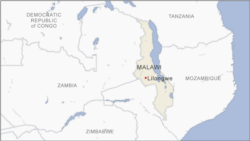A report released under Malawi's Human Rights Commission this month has found that police raped at least eight women and sexually violated several others, including girls, during October's post-election unrest. However, authorities are questioning the validity of the report and Malawi police say they will only act after carrying out their own inquiry.
The report, released Dec. 18 by Malawi's ombudsman, says the police assaults occurred in the homes of victims and were carried out in revenge for the stoning death of a fellow police officer.
Twenty-five-year-old "Grace," who is not using her real name, cried as she told a reporter how two Malawian police officers stormed her house in October, looking for her husband. She said they accused him of being involved in street violence, which broke out during ongoing protests over the re-election of President Peter Mutharika in May.
Grace says one of the policemen accused her of hiding her husband's whereabouts and then attacked her, pushing her down and undressing her. He raped her, Grace said, then stepped on her with his boots.
Twenty-seven-year-old "Rhoda" — also not her real name — told a reporter a similar story of being attacked by Malawian police. She said that when she told her husband about the attack, he said he could not stay with someone who was raped, for fear of contracting a sexually transmitted disease.
Rights officials say Grace and Rhoda are among a number of women and girls who were raped or sexually assaulted by police sent to control post-election violence on Oct. 8.
The alleged assaults were outlined in a 62-page report released Dec. 18 by Malawi's Ombudsman Martha Chizuma and Law Commissioner Rosemary Kanyuka.
Chizuma says the investigation, carried out under Malawi's Human Rights Commission (MHRC), uncovered evidence of the rapes.
"We found out that a total of 17 women were sexually violated," Chizuma said. "Five of them were under 18. One of the five girls was actually defiled. Eight women were raped. The rest, police found them doing their menses so were just violently beaten."
Chizuma said the alleged police assaults appeared to be in revenge for the stoning death of a fellow police officer by election protesters. The report identified suspected officers who were posted to the areas where the assaults occurred.
But observers note a lack of evidence, as victims failed to obtain medical exams after the alleged assaults and were unable to identify police officers, whose faces were covered.
Police response
Malawi police have not confirmed or denied the assaults, and have taken information from the alleged victims.
Police spokesman James Kadadzera says they are carrying out their own internal investigation, which started in October.
"And we are saying here that whatever the MHRC report is recommending and whatever our report will recommend, will be followed to its logical conclusion," Kadadzera said. "Nobody will be shielded but, justice will prevail."
Kadadzera was not able to say when police would finish their probe.
Meanwhile, no officers have yet been suspended or detained, and government authorities are questioning the validity of the report.
Controversy over commissioners
Government spokesman Mark Botomani told The Nation newspaper that any action by Malawi's Human Rights Commission should be scrutinized because there were no authorized commissioners.
The MHRC has been waiting for fresh commissioners since a court injunction stopped some controversial appointments by Mutharika.
But Chizuma and Kanyuka argue they are still members of the commission as their appointments were not part of the injunction.
They have called for immediate disciplinary action against the suspects.
Malawi has seen wave of violent protests since Mutharika secured a second term in May, which opposition leaders are challenging in court.
Meanwhile, rights campaigners have threatened to hold protests should police fail to act on the recommendation of the report by Jan. 9.





